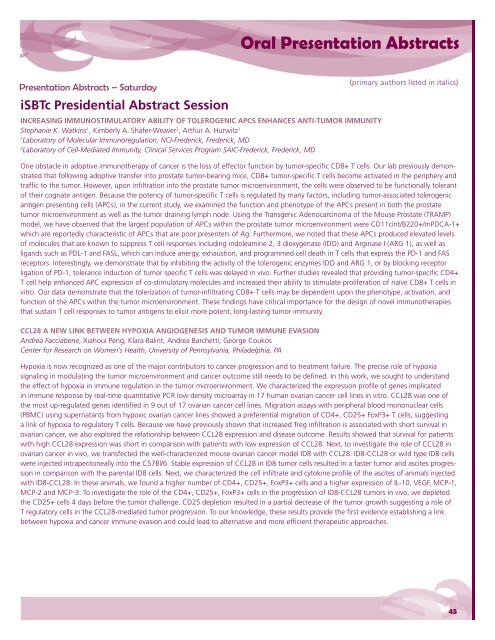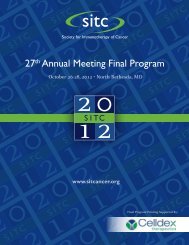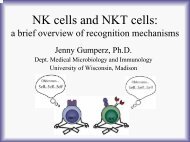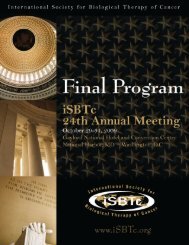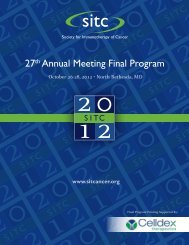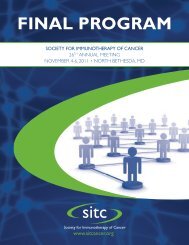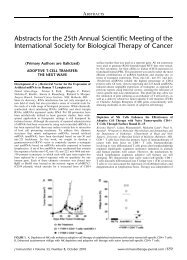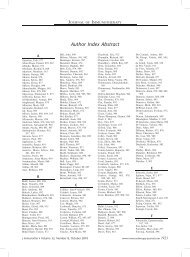Download Final Program - Society for Immunotherapy of Cancer
Download Final Program - Society for Immunotherapy of Cancer
Download Final Program - Society for Immunotherapy of Cancer
Create successful ePaper yourself
Turn your PDF publications into a flip-book with our unique Google optimized e-Paper software.
Oral Presentation AbstractsPresentation Abstracts – SaturdayiSBTc Presidential Abstract SessionINCREASING IMMUNOSTIMULATORY ABILITY OF TOLEROGENIC APCS ENHANCES ANTI-TUMOR IMMUNITYStephanie K. Watkins 1 , Kimberly A. Shafer-Weaver 2 , Arthur A. Hurwitz 11Laboratory <strong>of</strong> Molecular Immunoregulation, NCI-Frederick, Frederick, MD2Laboratory <strong>of</strong> Cell-Mediated Immunity, Clinical Services <strong>Program</strong> SAIC-Frederick, Frederick, MD(primary authors listed in italics)One obstacle in adoptive immunotherapy <strong>of</strong> cancer is the loss <strong>of</strong> effector function by tumor-specific CD8+ T cells. Our lab previously demonstratedthat following adoptive transfer into prostate tumor-bearing mice, CD8+ tumor-specific T cells become activated in the periphery andtraffic to the tumor. However, upon infiltration into the prostate tumor microenvironment, the cells were observed to be functionally tolerant<strong>of</strong> their cognate antigen. Because the potency <strong>of</strong> tumor-specific T cells is regulated by many factors, including tumor-associated tolerogenicantigen presenting cells (APCs), in the current study, we examined the function and phenotype <strong>of</strong> the APCs present in both the prostatetumor microenvironment as well as the tumor draining lymph node. Using the Transgenic Adenocarcinoma <strong>of</strong> the Mouse Prostate (TRAMP)model, we have observed that the largest population <strong>of</strong> APCs within the prostate tumor microenvironment were CD11cint/B220+/mPDCA-1+which are reportedly characteristic <strong>of</strong> APCs that are poor presenters <strong>of</strong> Ag. Furthermore, we noted that these APCs produced elevated levels<strong>of</strong> molecules that are known to suppress T cell responses including indoleamine 2, 3 dioxygenase (IDO) and Arginase I (ARG 1), as well asligands such as PDL-1 and FASL, which can induce anergy, exhaustion, and programmed cell death in T cells that express the PD-1 and FASreceptors. Interestingly, we demonstrate that by inhibiting the activity <strong>of</strong> the tolerogenic enzymes IDO and ARG 1, or by blocking receptorligation <strong>of</strong> PD-1, tolerance induction <strong>of</strong> tumor specific T cells was delayed in vivo. Further studies revealed that providing tumor-specific CD4+T cell help enhanced APC expression <strong>of</strong> co-stimulatory molecules and increased their ability to stimulate proliferation <strong>of</strong> naïve CD8+ T cells invitro. Our data demonstrate that the tolerization <strong>of</strong> tumor-infiltrating CD8+ T cells may be dependent upon the phenotype, activation, andfunction <strong>of</strong> the APCs within the tumor microenvironment. These findings have critical importance <strong>for</strong> the design <strong>of</strong> novel immunotherapiesthat sustain T cell responses to tumor antigens to elicit more potent, long-lasting tumor immunity.CCL28 A NEW LINK BETWEEN HYPOXIA ANGIOGENESIS AND TUMOR IMMUNE EVASIONAndrea Facciabene, Xiahoui Peng, Klara Balint, Andrea Barchetti, George CoukosCenter <strong>for</strong> Research on Women’s Health, University <strong>of</strong> Pennsylvania, Philadelphia, PAHypoxia is now recognized as one <strong>of</strong> the major contributors to cancer progression and to treatment failure. The precise role <strong>of</strong> hypoxiasignaling in modulating the tumor microenvironment and cancer outcome still needs to be defined. In this work, we sought to understandthe effect <strong>of</strong> hypoxia in immune regulation in the tumor microenvironment. We characterized the expression pr<strong>of</strong>ile <strong>of</strong> genes implicatedin immune response by real-time quantitative PCR low density microarray in 17 human ovarian cancer cell lines in vitro. CCL28 was one <strong>of</strong>the most up-regulated genes identified in 9 out <strong>of</strong> 17 ovarian cancer cell lines. Migration assays with peripheral blood mononuclear cells(PBMC) using supernatants from hypoxic ovarian cancer lines showed a preferential migration <strong>of</strong> CD4+, CD25+ FoxP3+ T cells, suggestinga link <strong>of</strong> hypoxia to regulatory T cells. Because we have previously shown that increased Treg infiltration is associated with short survival inovarian cancer, we also explored the relationship between CCL28 expression and disease outcome. Results showed that survival <strong>for</strong> patientswith high CCL28 expression was short in comparison with patients with low expression <strong>of</strong> CCL28. Next, to investigate the role <strong>of</strong> CCL28 inovarian cancer in vivo, we transfected the well-characterized mouse ovarian cancer model ID8 with CCL28. ID8-CCL28 or wild type ID8 cellswere injected intraperitoneally into the C57Bl/6. Stable expression <strong>of</strong> CCL28 in ID8 tumor cells resulted in a faster tumor and ascites progressionin comparison with the parental ID8 cells. Next, we characterized the cell infiltrate and cytokine pr<strong>of</strong>ile <strong>of</strong> the ascites <strong>of</strong> animals injectedwith ID8-CCL28. In these animals, we found a higher number <strong>of</strong> CD4+, CD25+, FoxP3+ cells and a higher expression <strong>of</strong> IL-10, VEGF, MCP-1,MCP-2 and MCP-3. To investigate the role <strong>of</strong> the CD4+, CD25+, FoxP3+ cells in the progression <strong>of</strong> ID8-CCL28 tumors in vivo, we depletedthe CD25+ cells 4 days be<strong>for</strong>e the tumor challenge. CD25 depletion resulted in a partial decrease <strong>of</strong> the tumor growth suggesting a role <strong>of</strong>T regulatory cells in the CCL28-mediated tumor progression. To our knowledge, these results provide the first evidence establishing a linkbetween hypoxia and cancer immune evasion and could lead to alternative and more efficient therapeutic approaches.45


